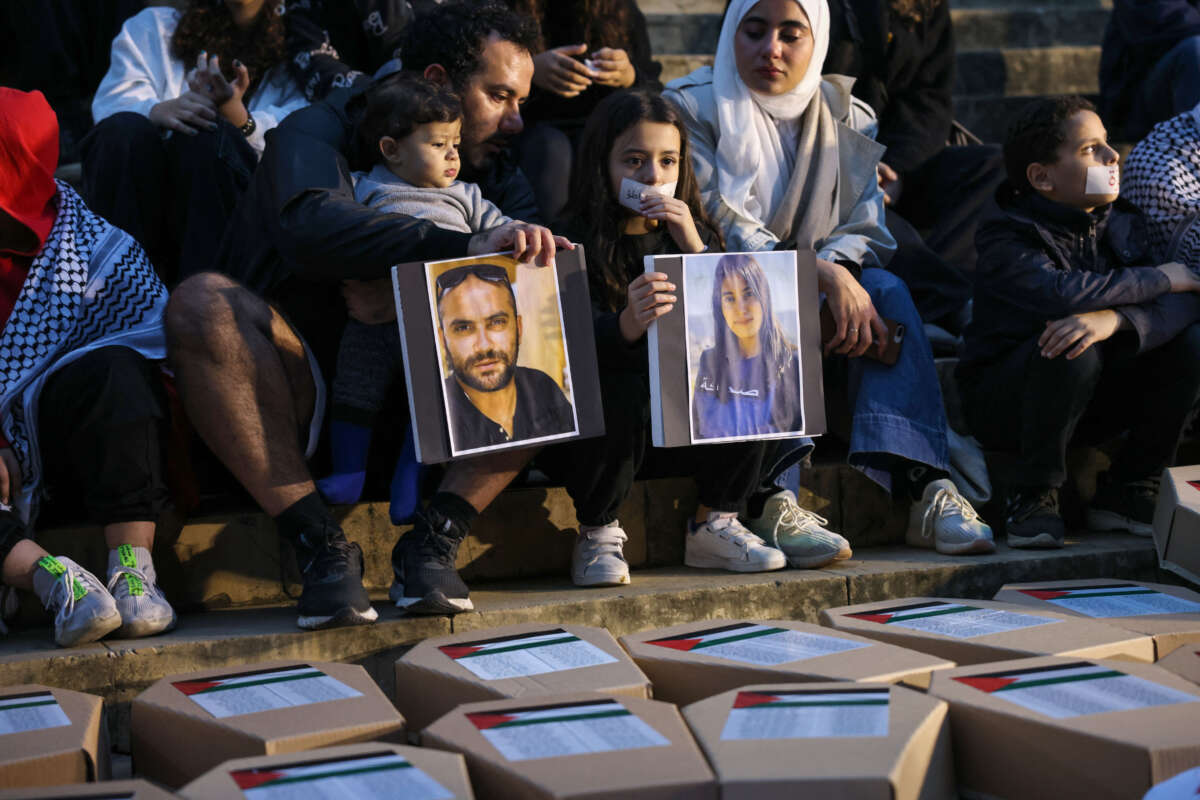Did you know that Truthout is a nonprofit and independently funded by readers like you? If you value what we do, please support our work with a donation.
The United Nations Interim Force in Lebanon (UNIFIL) has found that Israel breached international law in its October killing of Reuters journalist Issam Abdallah in Lebanon.
“The firing at civilians, in this instance clearly identifiable journalists, constitutes a violation of UNSCR 1701 (2006) and international law,” UNIFIL says in its February report.
The UNSCR 1701, adopted by the United Nations Security Council in 2006, is a resolution that aims to end the conflict between Israel and Hezbollah in Lebanon. The Unifil report states that the IDF violated the resolution by firing two 120mm shells at a gathering of “clearly identifiable journalists” without any observed cross-border hostilities between Israel and Lebanon for over 40 minutes before an Israeli Merkava tank opened fire.
The report demands that the Israel Defense Forces (IDF) “not fire on civilians, including journalists, and adhere to their responsibilities under UNSCR 1701 (2006) and international law and, regardless of the circumstances, to ensure the safety and security of civilians at all times.”
Since October 7, Israel’s brutal siege of Gaza has killed more than 31,000 Palestinians, including at least 126 journalists. Palestinian journalists have also reported receiving multiple threatening phone calls from Israeli officials before their family members were killed by IDF airstrikes.
“Since 7 October, more than one journalist a day has lost their lives during the war in Gaza, a scale and pace of loss of media professionals’ lives without precedent,” the International Federation of Journalists (IFJ) said in a December press release.
Free press organizations like the IFJ, Committee to Protect Journalists (CPJ) and Reporters Without Borders have demanded that the IDF end the systematic targeting and killing of Palestinian journalists.
“In 2023 Palestinian journalists in the Gaza Strip have been the victims of indiscriminate bombing by the Israeli army. The IFJ calls on international authorities to ensure that international law is respected and to put an end to the massacre of journalists in Gaza,” the IFJ said in a statement.
Additionally, investigations conducted by Amnesty International, Human Rights Watch, Reuters, and AFP regarding the Israeli strike that killed Abdallah and six other journalists found that the strike was likely an intentional attack aimed at the Reuters videographer.
“Israel says it does not target journalists. It needs to explain whether it used one of its drones for a precision attack on these two journalists [Al-Jazeera journalist Hamza Al Dahdouh and freelance journalist Mustafa Thuraya] and why it launched strikes on those like Reuters journalist Issam Abdallah, who was clearly wearing press insignia and away from direct fighting,” Sherif Mansour, CPJ’s Middle East and North Africa Program Coordinator, said in a January statement.
This new Unifil report officially confirms that the IDF has breached international law by “firing at civilians,” including journalists who were visibly identifiable as members of the press.
“(The) IDF should conduct an investigation into the incident and a full review of their procedures at the time to avoid a recurrence,” the report said in its recommendations. “The IDF should share their investigation’s findings with Unifil.”
The IDF has a longstanding practice of targeting journalists. Last May, the CPJ issued a report that found that over a span of 22 years, the CPJ has recorded at least 20 instances of IDF soldiers firing at and killing Palestinian journalists. Despite numerous internal IDF investigations, no one has been charged or held responsible for these fatalities. “The lack of accountability in these incidents has significantly eroded press freedom, leaving journalists’ rights precarious,” the report asserts.
“The international community, and more particularly the International Criminal Court, must face up to its responsibilities and thoroughly investigate, and where appropriate bring prosecutions to those who have ordered and carried out attacks on journalists,” the IFJ said.
Media that fights fascism
Truthout is funded almost entirely by readers — that’s why we can speak truth to power and cut against the mainstream narrative. But independent journalists at Truthout face mounting political repression under Trump.
We rely on your support to survive McCarthyist censorship. Please make a tax-deductible one-time or monthly donation.
